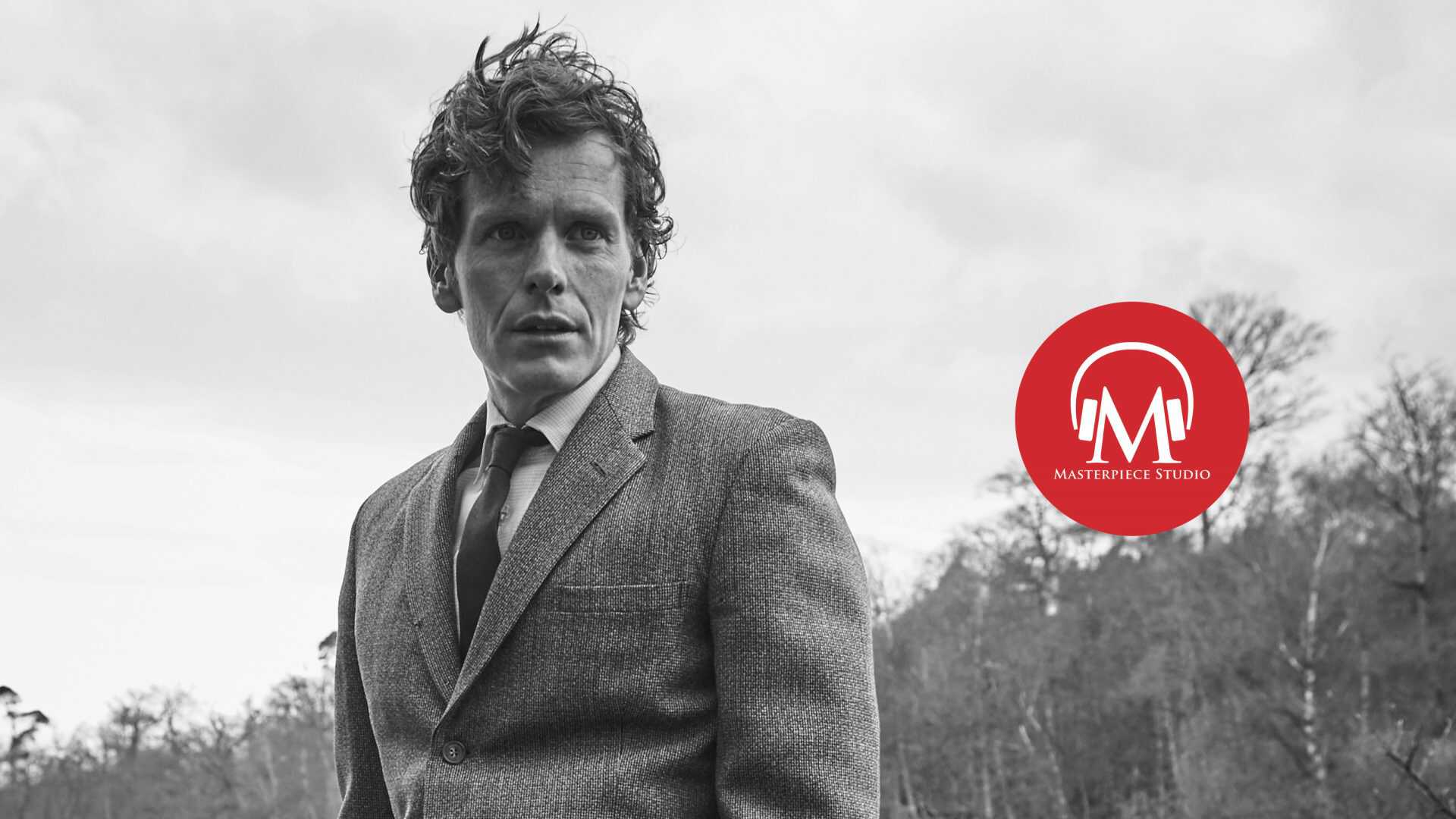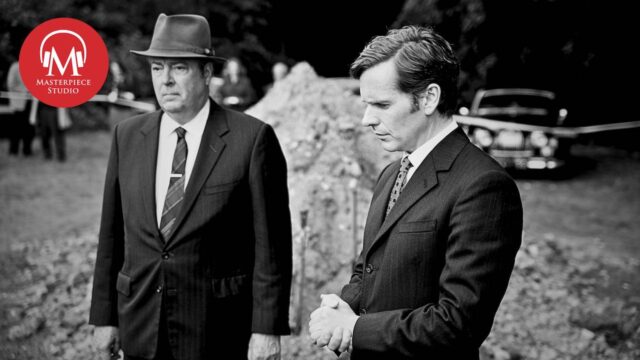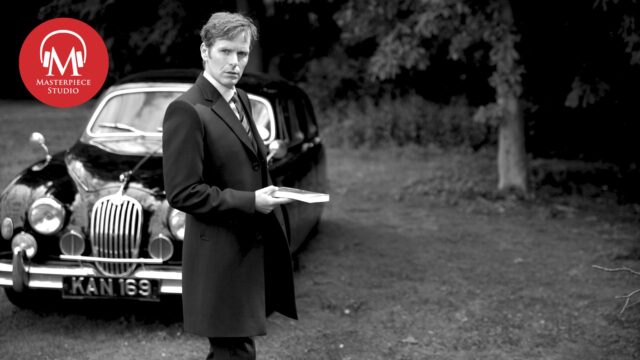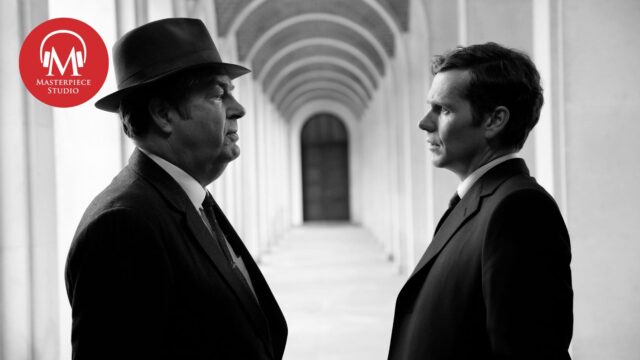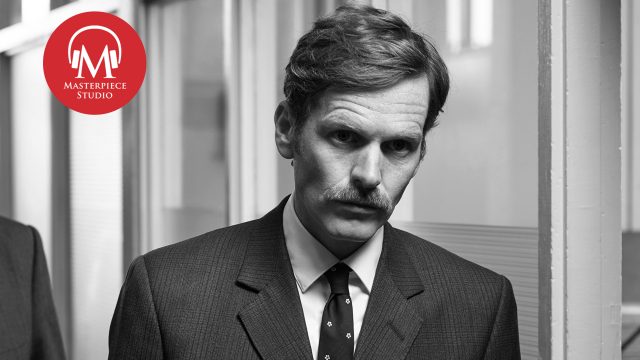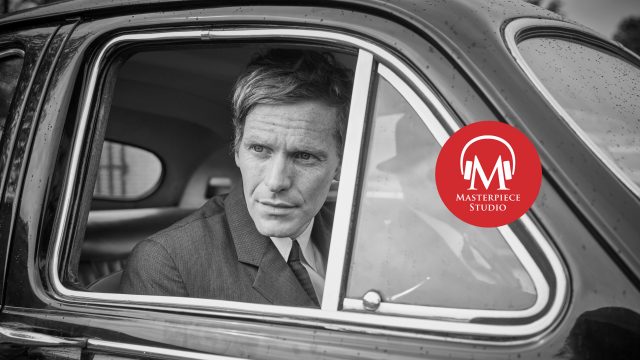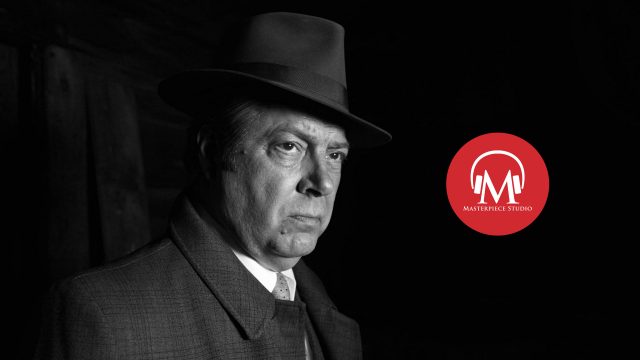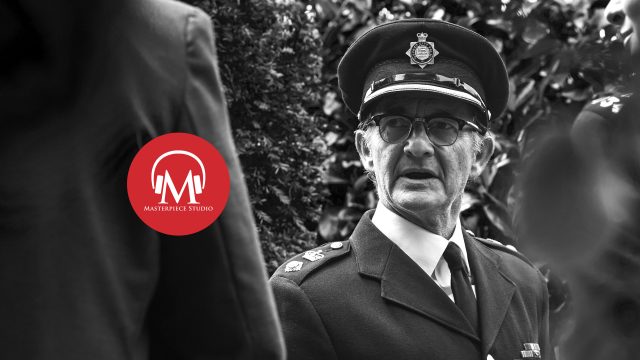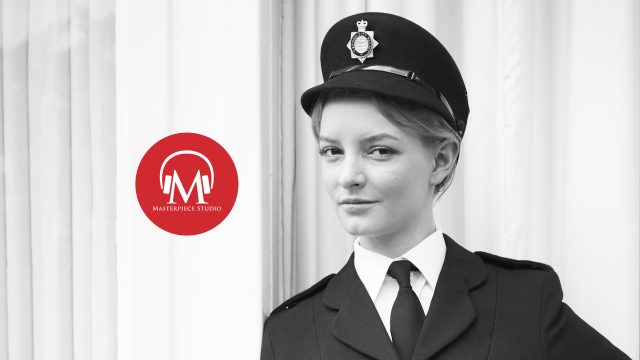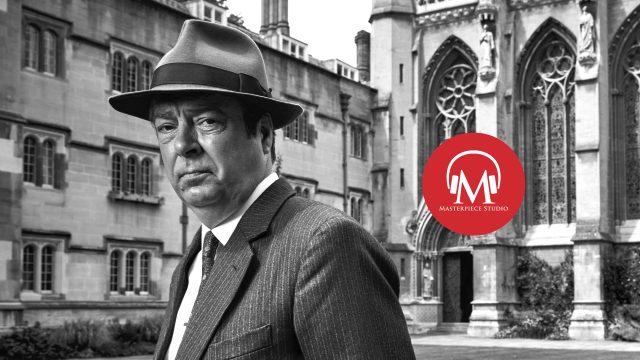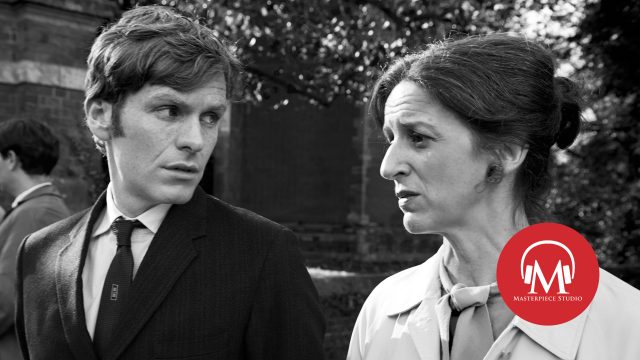Jace Lacob (Jace): MASTERPIECE Studio is brought to you by Audible. For a free trial, go to Audible.com/Masterpiece.
CLIP:
Doc: Now what’s this about a sergeant’s exam? Pastures new?
Morse: How’s that?
Doc: There’s not going to be room for two sergeants at Cowley, is there?
Jace: I’m Jace Lacob and you’re listening to MASTERPIECE Studio.
Endeavour’s DC Morse has come a long way since the beginning of this season. When we first caught up with the detective, Morse was fresh out of prison and refusing to return to the force.
CLIP:
Morse: I can’t. I’m not the same. I wouldn’t be any use to you.
Jace: But try as he might to quell his detective’s instincts, Morse couldn’t stay away for long:
CLIP:
Shaun Evans: You try to run one way, but actually there’s a girl’s dead body waiting for you to solve the crime, right in your path.
Jace: In the wake of the Season 3 finale, “Coda,” Morse is both more experienced and more troubled.
He’s taken his sergeant’s exam, dealt with Thursday’s violent antics, survived a bank heist and tiger attack, and realized that he’s in love with Joan.
So where will all these new developments lead the melancholy detective?
CLIP:
Shaun Evans: I’d like to see this person become very happy for an incredibly short amount of time, and then be very sad again.
Jace: Endeavour’s leading man, Shaun Evans, joins us on the podcast to dig into everything that happened in the intense Season 3 finale, and to talk about what he’d like to see happen in Morse’s future.
Jace: And this week, we are joined by Shaun Evans, welcome.
Shaun Evans (Shaun): Thanks for having us on tonight. I appreciate it, like.
Jace: Of course. What went through your head the first time your agent brought up playing the character of Endeavour Morse?
Shaun: What went through my head the first time? I was in the US at the time, and he called me about it, my agent in the UK, and said, “What do you think about this?”
So I said, “Well, let me do some research, man,” so I went to Barnes & Noble and picked up what books I could, and … Because it was based on 13 books, originally. And so I started to read the books, and after the first one, I thought, “God, this is incredible,” like, “This is a brilliant character, and I wonder what makes him this way?”
Then I came back to the UK and met with the producers and the writer, and we just had a talk about it, and it seemed to me, when we had a conversation, that we all chimed on the same sort of elements, that I wasn’t interested in doing a kind of impression of somebody else’s work; it’s just not something that would appeal to me, and they felt the same as well. And then I read a script, and we took it from there.
Even now, I think, “God, it’s incredible.” I actually thought it would just be a one-off. I didn’t think it would go on and on, you know? I didn’t think that we’d be making 13, as we have done now. So I feel very pleased about that, because realistically it could have gone either way.
Jace: Given the fact that you were coming to it fresh and via the Colin Dexter books, what struck you most keenly about the character of Morse in preparing for the role?
Shaun: The sadness of it, I suppose. I mean, this is a character who’s pretty melancholy and who’s in his mid-50s and is alone, drinks too much, is not a happy person… And I know that’s kind of a cliché for detectives, but there’s something about it I thought, “That’s interesting, how do you get this guy now to where he is then.” And, “If we can start to see who this person is when he’s in his mid-20s, then that’s an interesting starting point,” I thought.
So it was that, really, you know: What is there in your mid-20s that makes you who you are in your 50s, you know?
Jace: The first film this season, “Ride,” offered a decadence that we haven’t seen on Endeavour to date.
CLIP:
Kay: Are you falling in love with me? Men do.
Morse: I can see how that might happen.
Kay: Then why don’t you kiss me?
Jace: What was it like filming that shift as we move closer in the timeline of the series to the summer of love?
Shaun: It was terrific, but for me, it’s always… One of the main joys about this job is that each week we get a brand new cast. Now I think the success of each story, or what determines the success of each story, is how well we create the world, the external world, outside of the police force, where the crime takes place.
Now, we had incredible good fortune on that one, as we often do, but I think on that particular film, all the elements came together pretty well. We had the same on the fourth one just recently where the bank robbers really came and invested in it, you know? And invested in their part, and invested in creating an atmosphere and creating a world that we, just for one week, can go and inhabit.
Jace: At the end of season two, we left Endeavour in jail, after he was framed for murder. How has his time in jail changed him?
Shaun: Well, I think he is, and rightly so, disappointed with his colleagues and the force in general. He meets these new people, and begins to explore what he would do if he wasn’t working for the police force.
I mean, it’s clearly not working out. He’s been like, shot, stabbed, fallen through floors, he never seems to get promoted, and now he’s ended up in prison.
It would be a time to regroup and think, “Is my life going the way I want it to go?”
And I think that’s where we find him at the beginning of the third series, and then he meets these people, he’s exploring new options, new avenues in life.
But, as the fates would have it he comes across the body of a dead girl, and so … I mean, that’s what’s beautiful about fiction, isn’t it? You can see what the Gods want for you, you try to run one way, but actually there’s a girl’s dead body there waiting for you to solve the crime, right in your path, so you can’t run. You know?
CLIP:
Morse: …You live in the shadows long enough, you forget the sunlight. I’m finished with it.
Thursday: You didn’t put your papers in.
Morse: Well I’m still suspended. Pending inquiry. If they want me gone they can fire me.
Thursday: Then what? You just gonna sit here feeling sorry for yourself?
Jace: “You live in the shadows long enough, you forget the sunlight.” Are we seeing a more jaded, darker version of Endeavour here?
Shaun: Well, I mean, I was joking earlier, but if you think about it, like, this person has gone through all of these things, and also you have to factor in that this person has a tendency towards melancholy and mulling over things, which is part of what makes him brilliant, but also could be potentially part of his downfall as well. And so yes, I think you are seeing a slightly more belligerent … Because of course, this person has to turn into the person in the books or the person on the TV series.
And also, that is far more interesting. Someone who’s got their life completely worked out and completely in order and is happy all of the time, whilst I’d be delighted for them, it’s not particularly engaging to watch, do you know?
Jace: Because we know how Morse’s story ends — we know he doesn’t give up police work — but what is Endeavour’s relationship to the job throughout this season?
Shaun: You know, I’m always asking myself that question, actually, and it’s difficult to say, isn’t it, that relationship.
Of course he’s tired and invested in the people that he meets there, especially Thursday and Strange, and to a degree, Bright as well. But it’s a pretty thankless job I think for him on most levels.
But this is a place where he finds his groove; someone who likes crosswords, he likes to work out a cryptic puzzle, seems to have a mind which is adept at solving these particular crimes, which happen in this particular place.
However, he needs to be in the police force in order to do that rather than be in a, I don’t know, a private investigator or something, you know? But you know, from an narrative point of view, of course that creates great conflict.
Jace: The central relationship of the series is that between Thursday and Endeavour, who have fallen into a sort of mentor/student, father/son dynamic; it’s not so easily describable. How do we see their dynamic shift in the third season?
Shaun: I think at the beginning … Actually, I don’t think, I know. At the beginning, Thursday is pulling Endeavour back to work, back to his rightful place, and by the end of the third series, we see that Thursday is… maybe needs pulling back to work, himself.
CLIP:
Morse: Funny, that never came up in the sergeant’s exam.
Thursday: What didn’t?
Morse: Knocking informants around til you get what you want.
Thursday: Not everything’s unfitting.
Morse: Is that how we do things now?
Shaun: He started to use methods that Endeavour doesn’t necessarily agree with that actually there’s a better way to do things, you know? So that’s the shift I think that takes place in this one.
Jace: What is it like filming with Roger Allam, and what have you learned from working so closely with him?
Shaun: What’s it like? Oh, it’s… I mean it’s terrific, I think. But it’s funny because we’ve … There’s twice we’ve supposed to have– our parts are supposed to have crossed on previous jobs as well, which then it never worked out, so I’m delighted that we get to hang out and work together now, because I think he is terrific. And he just creates Thursday so brilliantly, I think, just inhabits it. But he’s also really open and really fun, and likes to have a laugh, and doesn’t take it all too seriously, you know? So he’s kinda … It’s a joy, really, it’s a joy.
If only he said the same. I’m joking.
Jace: He did say the same.
Shaun: Course he did. I paid him.
Jace: “Arcadia” sees the arrival of WPC Shirley Trewlove to the Oxford City police. How would you describe the dynamic between Trewlove and Endeavour? Are they potential love interests or rivals?
Shaun: I think it’s still… I think it’s still up for grabs. I don’t think they’ll be rivals, I don’t think they’ll be love interests either. But I think we’ll have to just wait and see how that develops.
CLIP:
Morse: Police: seems an unexpected choice for someone like yourself.
Trewlove: What is someone like myself?
Morse: I don’t know. Bright, I suppose.
Trewlove: What are bright girls supposed to do – marry well?
Morse: Oh, I just meant it can be a pretty grim kind of a calling.
Trewlove: Maybe I like grim.
Shaun: It’s all well and good thinking, “Oh, we’ll bring this character on. They can be a potential love interest,” but you have to see how it works on set, you have to see how it works, how they interact with each other.
I think the beauty about Dakota and — Dakota playing Trewlove — is she’s clearly a very bright character and I think that they connect on that level, and so I think she’d actually be a good wing-person to have rather than like a lover or someone to create conflict with.
Now, that’s a thought from Endeavour’s point of view. Of course he’s clearly smitten with somebody else.
Jace: I love the scene in “Prey,” in the maze, where Endeavour attempts to shield Julia and the baby from the tiger by sacrificing himself. What was it like shooting this scene and its outcome with Superintendent Bright saving the day?
Shaun: Brilliant, and I really think that that’s a great … I think it’s so important because you can’t have the characters just be in the same drama all the time. It’s brilliant that, just from a dramatic and a narrative point of view, that Bright comes in and saves the day, and so now I am indebted to him.
If you remember, at the end of the second series as you said, he gets put in prison, and Bright is very passive in that and does very little in saving him, and so it’s a terrific opportunity. And also it’s a great opportunity for the audience to see more about Bright’s backstory, who he is before who he was as a police officer.
And so it was a joy, really. Do you know, it was a joy.
Jace: Endeavour and Strange’s comradery morphs into something else this season with Strange’s promotion to detective sergeant. With Strange now his superior, how comfortable are these two in the third season?
Shaun: Um, I think … Look, it’s never gonna be pleasant being passed over for somebody else. And also when Strange perhaps got the job by underhand means, because he’s part of the Freemasons, that he wasn’t necessarily the best person for the job. You don’t want it to be too cozy on the police force, where everyone’s all getting on famously.
CLIP:
Strange: Don’t ever do that again. If I’m questioning a suspect I expect you to back me.
Morse: Questioning a suspect? If you want to take a leaf out of Thursday’s book, there’s better places to start.
Strange: Look, let’s get one thing straight, matey. You don’t tell me, I tell you. All right?
Shaun: There’s a tension there, but I think ultimately, they’re all after the same thing, and so the tension has to ease.
Jace: I’d love to take a look at “Coda,” more specifically, which might just be my favorite episode of Endeavour yet.
Shaun: That’s the fourth one, isn’t it?
Jace: The fourth one.
Shaun: Yeah, that’s my favorite as well, as it goes.
Jace: Is it?
Shaun: Yeah. I just think all the elements really came together on that one.
Jace: I mean, it has such incredible inherent tension. The resolution to the bank heist storyline was intense, to say the least.
CLIP:
Morse: The chamber’s empty. Only he’s too stupid to count to six.
Matthews: I’ll show you stupid! [shots] Aaargh!
Jace: Do you feel that Endeavour knew that there was still one bullet left in the chamber, and how willing was he to sacrifice himself in that moment?
Shaun: I think we have to believe that he did know, that he counted, because we’ve had so many conversations about this: was it clear going into it? How much does he know, or how much of it is a happy accident? And I think you have to go for the most dramatic all the time: He has to know.
You know how it goes with TV, who knows if you’re ever gonna come back and make any more, you know? Nothing’s for certain, so my feeling was “if this is gonna be the last one, we’ve gotta make it amazing, you know?”
And also it feeds into sort of recklessness, as well, about this. You know, this person, especially with regards to Joan, there has to be a recklessness, that you know. He’s willing to sacrifice his own life in a way to make sure that she’s okay.
That sounds very dramatic, but I mean, I think it is.
Jace: Why doesn’t Endeavour tell Joan that he loves her when he does have the opportunity?
Shaun: Oh, $64,000 question.
There were so many back and forths about this, I’ve gotta tell you. And for me, I really … not agonized, but I thought, “Well, why go to all that trouble and not say anything? Why not? Why not just say something?” And we spoke about it constantly with the writer and it was his instinct that he doesn’t say anything, and I thought, “Why? But what’s the- why not just say one thing, not just say … Even call her by her first name?” You know? Why not say something, you know?” So you go with the majority sometimes, in cases like that. But I think it plays … I think it plays beautifully, you know?
Jace: I mean, so much of the show is in the unstated, rather than the stated.
Shaun: Mm-hmm.
Jace: That’s not just between Endeavour and Joan, but also Endeavour and Thursday this season.
Is there any possible future where perhaps he does find love even if for a small moment?
Shaun: Yeah, I’d like to think so. I’d like to think so, because otherwise we’re just … Again, we’re banging the same drum. No, I’d like to see — again who knows how long this is gonna go on for — but in an ideal world, I’d like to see this person become very happy for an incredibly short amount of time and then be very sad again.
I think that’s dramatically interesting. It’s very sad, I think, for someone to not have any light in their life in that regard, you know?
Of course, it’ll have to end in tragedy, but I’d like just for a moment to think that it’s not going to.
Jace: How should viewers read that final silent scene between Endeavour and Thursday at the end of the season? Should we see the fact that Endeavour follows Thursday into the house as perhaps offering some hope or has their relationship finally fractured?
Shaun: Well, you just have to wait and see, and you can take it exactly how you want. We’re just in the middle of shooting the first one now, the first one of the fourth series, and this is a question that I was– we were constantly talking about: How much did we say? Where is the relationship now? How much does he know about myself and Joan?
All of these questions… And what we’ve tried to do in the first film of the fourth is to keep all of that bubbling away, because we pick up just two weeks after we drop off.
I don’t want to reveal too much about that, but I feel like we are creating something quite interesting there now with these guys.
Jace: You mentioned your love for the fourth episode this season, “Coda.” I’m wondering if there’s a favorite scene that stands out to you from this third season?
Shaun: Yes, and it’s the last scene where Joan leaves.
CLIP:
Morse: Where will you go?
Joan: I don’t know.
Morse: Stay.
Joan: I can’t.
Morse: Just give it time. Everything that happened, just give it a chance. You mean the world to them. You mean the world…
Shaun: Throughout, we’ve always had little glimpses of them catching each other’s eyes in the mirror, in walking her home, seeing what’s going on, and I’ve always been curious. And each time we have an interaction I always say, “Where are we going with this? Where are we … What are we doing here? Should we be playing that there’s a bit of an attraction here, or should we be … should she just be my boss’s daughter?”
CLIP:
Joan: The scarf. New? Oh.
Morse: Yes.
Joan: Mm, where’s that from, then?
Morse: From Burridges, by the label.
Joan: You’re very literal.
Morse: It’s a failing.
Joan: You’ve never picked that. So who’s the admirer?
Mrs. Thursday: Don’t tease, Joan.
Shaun: I think for something to be engaging, the audience have to root for what the hero wants. Now, if the hero doesn’t know what he wants, it’s difficult for them to root for him, then it just becomes procedural, every week he solves a case. Whereas, if you think of the great sort of stories of like Friends, or like Sex and the City, or any of those stories, you can think, “Will they get together? Won’t they get together?” And it’s that which is engaging.
God I’m going on now aren’t I?
But in conclusion I was pleased because I really felt strongly that there should be some interaction between those guys that we’re really driving towards. But I feel like it really came, the heart of the story, came to fruition in the final scene.
Jace: Kevin Whately has retired from Lewis after 30 years of playing Robbie Lewis. Could you see yourself continuing to play Endeavour Morse for the next 25 years, or another 20 films to get you to 33?
Shaun: Never say never, but I would prefer to get in, do something that you’re proud of, and get out. I think any creative endeavor needs to be — If you’ll excuse the pun.
Needs to remain vital, I think. I would hate to get complacent about this job, playing this part, or any of the work that I do, to be honest with you.
At the end of each series, you know, we assess and say, “Did we achieve what we set out to do? Is there still a story to tell?” But it goes back to that other question as well: what does he want? Does he want to be with Joan? But I think that’s the question really. That’s the question really.
Does that make sense, Jace?
Jace: It does, it does.
The 30th anniversary of Morse is next year. Why do you think that this character has held such a powerful appeal for viewers?
Shaun: Oh, I don’t know. It’s difficult to say that, isn’t it? It’s difficult to say. And I kind of… I really don’t want to think overly about that. You know, I just think if you tell a good story and you tell it well, however that- whatever that means to the people who are making it. But I think it’s that really; I don’t think it is the character per se, it’s like, it’s a good story, well told. That’s my opinion on it, anyways. That’s what I’m sticking to.
Jace: Endeavour is over for now, but MASTERPIECE’s summer of mysteries and the Morse legacy will continue with the original Morse spin-off, Inspector Lewis.
Even though Lewis is a different kind of inspector — one that’s more easy-going and less snobbish than Morse — the Oxford mysteries he and his team investigates are just as sinister.
CLIP:
Lewis: You’re saying this could be staged? Someone could have forced the drugs into her?
Hathaway: We’ll we can’t rule it out, can we?
Jace: With seven seasons and 30 episodes behind them, Lewis returns to MASTERPIECE Sunday, August 7th for one final season.
CLIP:
Kevin Whately: I’m very proud of what we did, but the reality is that in this country we’re meant to retire at 55 — the police are — and I’m 10 years beyond that age and so I didn’t want to be a 70 year old TV cop.
Jace: Learn what it’s like to say “goodbye” to a character you’ve played for the past several decades from the likes of actors Kevin Whately and Clare Holman by tuning into the MASTERPIECE Studio podcast every Monday following Inspector Lewis.
Find us at pbs.org/masterpiece or on iTunes and Stitcher.
MASTERPIECE Studio is hosted by me, Jace Lacob and produced by Rachel Aronoff. Kathy Tu is our editor. Special thanks to Barrett Brountas and Nathan Tobey. The executive producer of MASTERPIECE is Rebecca Eaton.
MASTERPIECE Studio is brought to you by Audible.
Sponsors for MASTERPIECE on PBS are Viking River Cruises, Audible, and The MASTERPIECE Trust.








